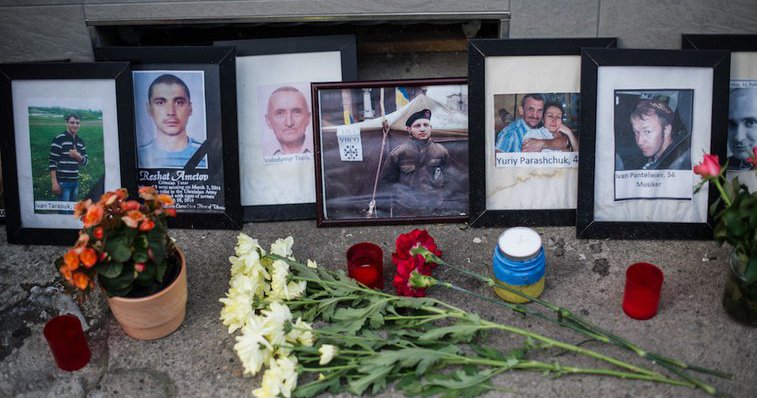
Six years have passed since dozens of Euromaidan activists were shot to death in the centre of Kyiv. In the years following, a Kyiv court has heard evidence from relatives of the dead and wounded survivors. It has now moved on to questioning former members of Berkut police squad, accused of the shootings. But last December, a Kyiv court released five convicted ex-Berkut officers as part of a prisoner exchange between Ukraine and Russia.
The shootings on Kyiv’s central Instytutska Street on 20 February 2014 are central to the investigation into the events of Euromaidan. In the dock are five ex-members of Berkut: Serhiy Tamtura, Oleksandr Marynchenko, Pavlo Abroskin, Serhiy Zinchenko and Oleh Yanishevskiy. These men are accused of killing 48 people and wounding 80, and their trial has been going on for over four years in a Kyiv court.
Last summer a court heard evidence from witnesses for the prosecution and started questioning defence witnesses, among them former and serving Ukrainian politicians, as well as colleagues of the defendants who also worked for Berkut. At that point, all five were in detention, but in July 2019 a court released one of the accused, Serhiy Tamtura.
A few months later, a court softened the restraint on another defendant: Oleksandr Marynchenko was released from pre-trial detention and transferred to house arrest. In December 2019, the court held another sitting and ordered an adjournment until 14 January 2020, but none of the defendants were present after New Year. The ex-Berkut officers had been included in an exchange as part of the Normandy Format talks, aimed at ending the armed conflict in eastern Ukraine.
On 29 December, a day before the exchange, Kyiv’s Appeal Court, which was examining requests for lighter penalties for all the defendants, released the five men on bail. Serhiy Tamtura and Oleksandr Marynchenko were in court with their three lawyers, while the other three, Pavlo Abroskin, Serhiy Zinchenko and Oleh Yanishevskiy took part in the session by video conference.
Some relatives of victims were also present in court, although most of them took part in the proceedings from other cities – Rivne, Vinnytsia, Chernivtsi, Lviv and others – via video conference. The victims’ families said that they had no prior knowledge of the meeting, so couldn’t arrive on time. They also asked for the meeting to be postponed until the next day. Moreover, the relatives of the family killed on Institutskaya Street stated several times that the Ukrainian government hadn’t asked their opinion on the prisoner exchange or the fact that the accused would not be returning to the courtroom.
But the decision had already been taken, a fact confirmed by Ukraine’s General Prosecutor Ruslan Ryaboshapka, who had sent a letter to the Appeal Court requesting lighter sentences for the ex-Berkut officers. Ryaboshapka explained this by the fact that Ukraine and Russia had come to an agreement on the upcoming exchange, and that if the five were freed they would be immediately handed over to the unrecognised separatist territories in Donetsk and Luhansk.
PrintTetiana Bezruk | Radio Free (2020-02-19T23:00:00+00:00) Six years after Ukraine’s revolution, justice for the Euromaidan dead is still far away. Retrieved from https://www.radiofree.org/2020/02/19/six-years-after-ukraines-revolution-justice-for-the-euromaidan-dead-is-still-far-away/
Please log in to upload a file.
There are no updates yet.
Click the Upload button above to add an update.